One minute it was there. The next, it wasn’t.
My phone, that is.
I don’t usually travel with one. Many reasons for this. They get lost (case in point, yesterday morning). Prime targets for pickpockets. They are a goddamned pain to keep charged in a place where electricity is a distant reality, especially when someone has relieved you of your expensive power source.
In many ways it’s an annoying POS, but in so many others it’s hugely useful.
Not when it gets eaten by a bunch of rocks, however.
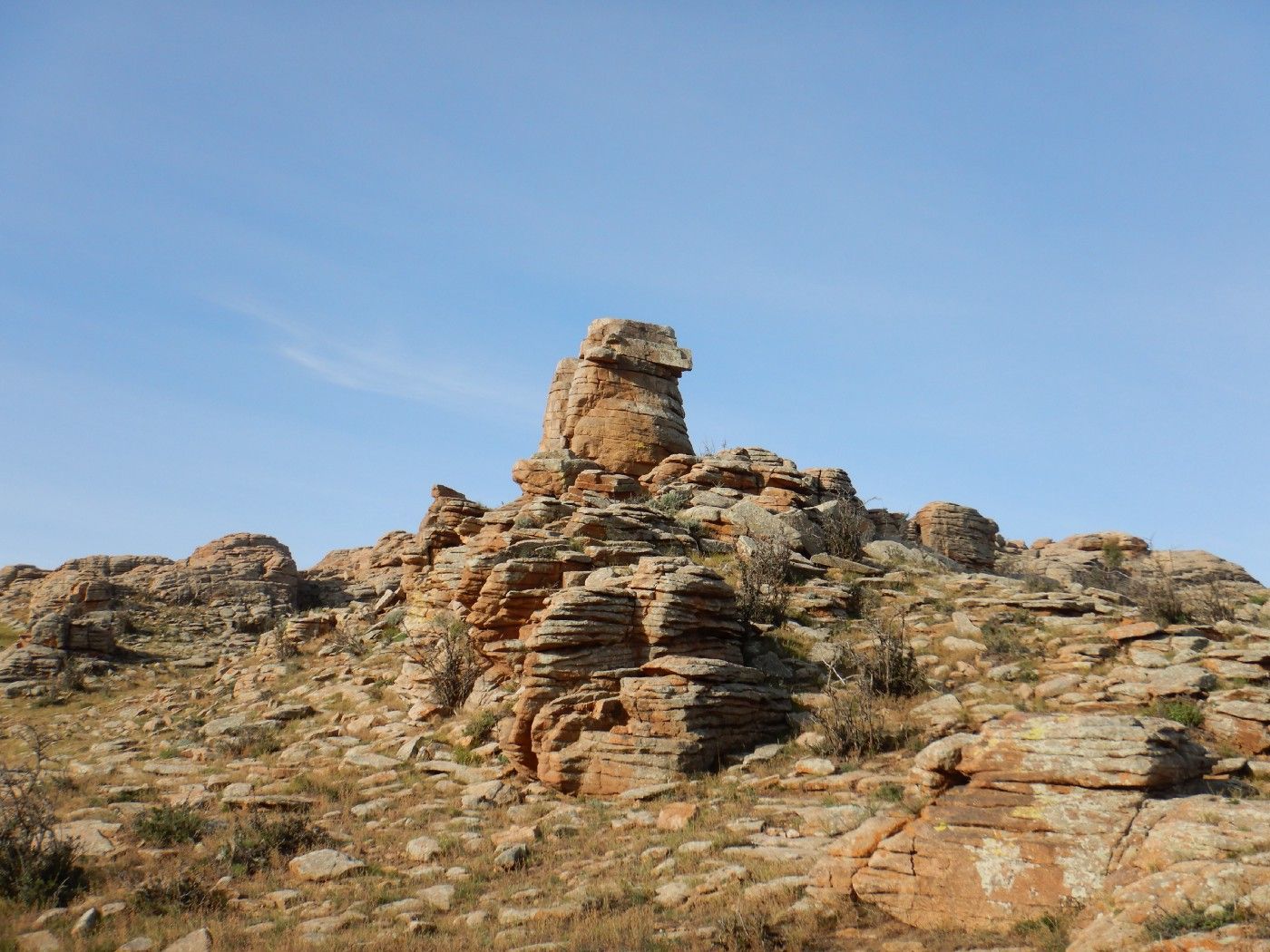
Deep in the distant desert of the Mongolian outback, which is most of the country, lies a rock formation that begs belief. When we veered off the rare bit of asphalt, sped through a dusty town and headed west towards what was promised (and delivered) as a brand new and very quiet tourist ger ( a ger is the Mongolian word for the circular white house that nomadic people live in out on the open plains) camp, I had no idea what was in store.
As Nasa drove the bumpy, unpredictable dirt trails that skitter off in every direction with the skill of the uber-experienced adventure driver that he is, I watched massive rock formations rise out of the dusty ground. The sky, always and forever that eye-burning perfect blue that is juxtaposed against the sand in dry country worldwide, provided a stark contrast to the heaped jumbles.
For all the world, they were the perfect inspiration for the Stone Giants of Middle Earth, those monsters having a go at flinging rocks at each other as Bilbo and the Dwarves huddled in terror below.
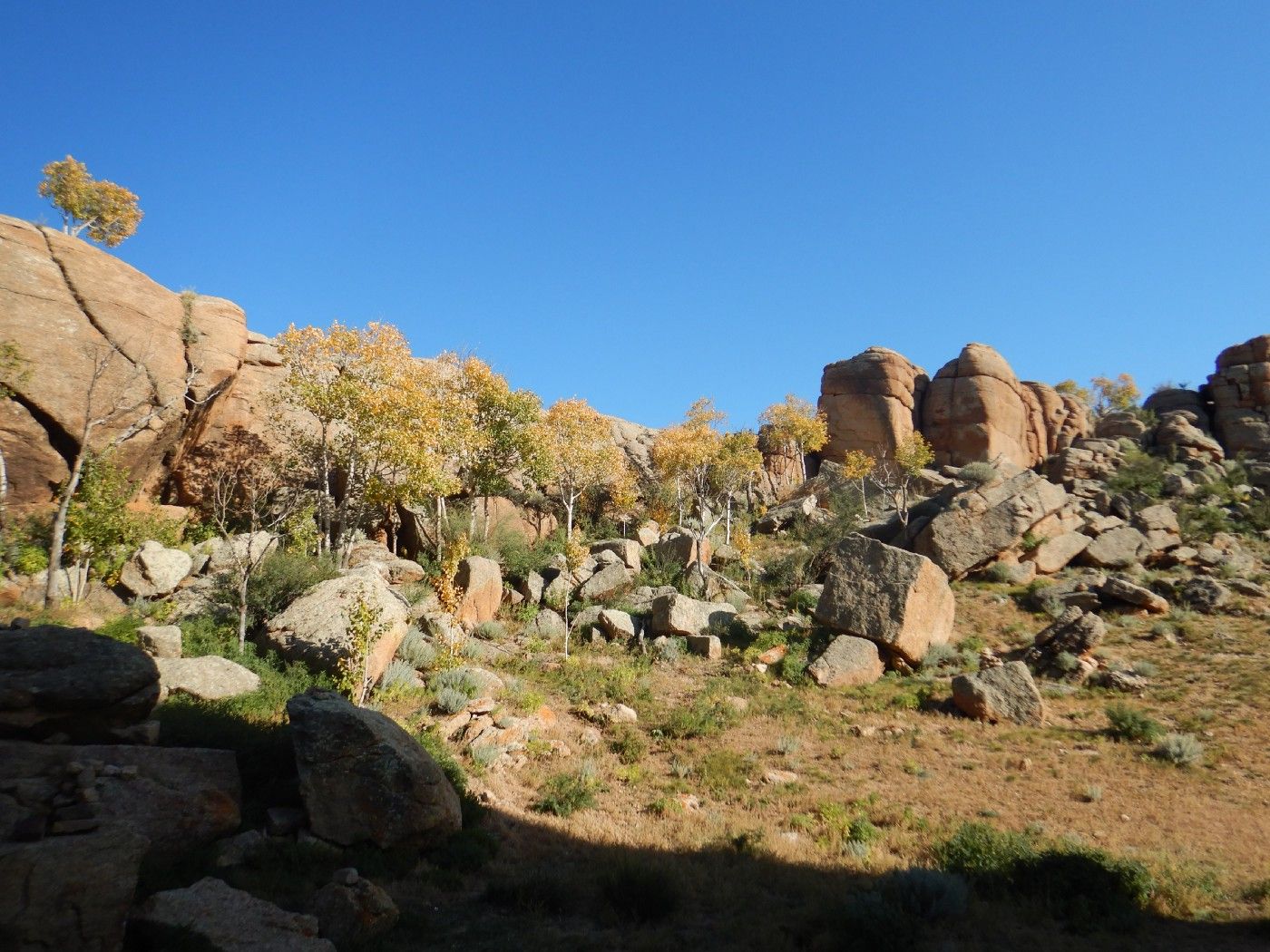
The rocks were strewn in profusion in all directions. Falcons sat stationary on one promontory. Well below, scattered herds of horses, goats and sheep dotted the landscape.
The ever-present wind whirled and danced in all directions, guided through the rock tunnels and sped up by geography. The granite was marked by millennia of wind carving, multi-colored lichen and the odd tree here and there.
I was entranced. This is my kind of place.
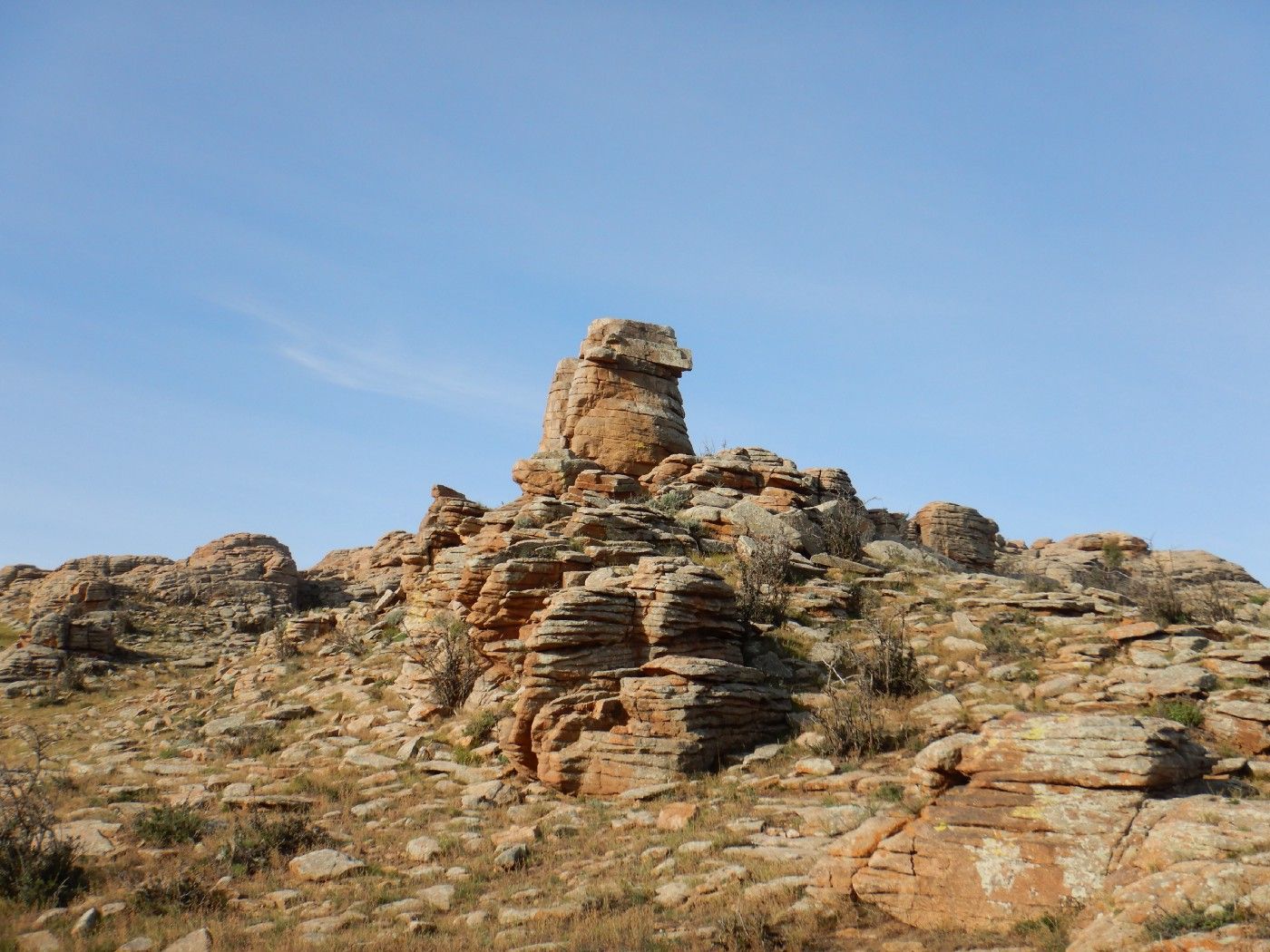
I found a spot, settled in and just sat. Listened. I could hear eagles. A few clicking insects as they flew by. My god, what a place. No wonder the monks built a monastery here. Monks in this part of the world did the same thing that America’s halfwit survivalist groups do today: they found and commandeered some of their country’s most magnificent, isolated spots. For monks, prayer. Survivalists, war preparation.
I prefer monks, but that’s just me.
Because like them, I love to meditate, study and do my best to practice Buddhism, and can most certainly hear wisdom in the kind of wild silences that are offered by this kind of landscape. This kind of landscape feels sacred.
Because it is.
I closed my eyes and drank it all in. Felt the sun move towards the West. On occasion I smelled the smoke from Nasa’s cigarettes. Maybe the Bourbon-scented loose tobacco I had brought from America as a gift. A whiff. Nothing more.
My guides finally convinced me to give up my perch and rejoin the living, which I did reluctantly. We drove to the tourist ger for the night.
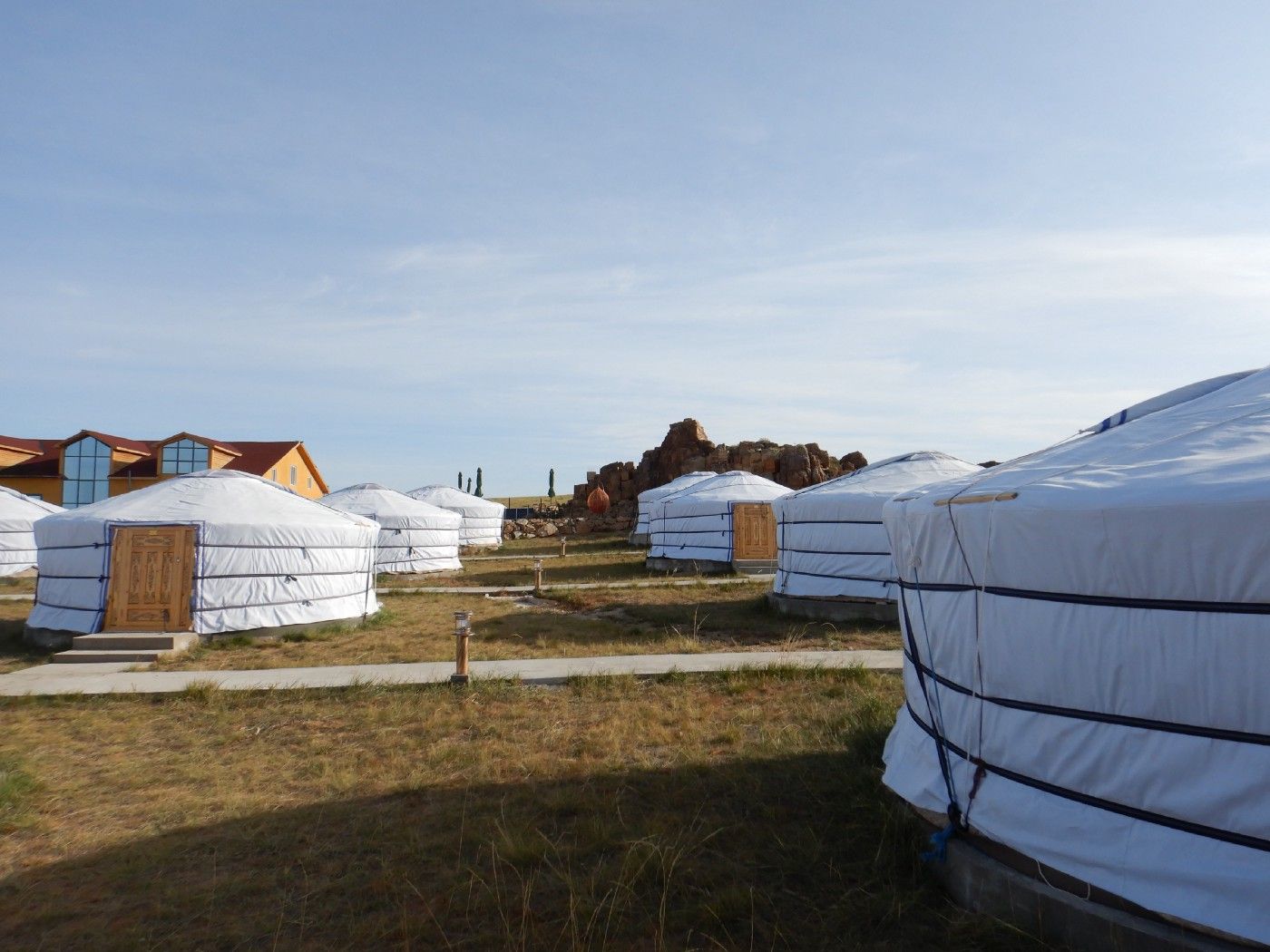
After a deep sleep (well, partly, I fell off the tiny twin bed while cocooned in my sleeping bag and landed full force on my left knee. The same left knee that I smashed against a tree while riding in Canada on a hurried horse who took a sharp turn. The same left knee…well, you get the picture. The patella is mobile, for some strange reason) we headed back out.
I had insisted on quiet time. I am happy to be driven some 1400 miles or so but being a very, very private person, I need to air out ( Okay okay, I needed to let them air out). So I slipped my camera and phone and a KIND bar into my coat and started a slow walk. Way, way, way off there was a trio of horses. I made my way in that direction.
It’s simply remarkable what slow walking will reveal.
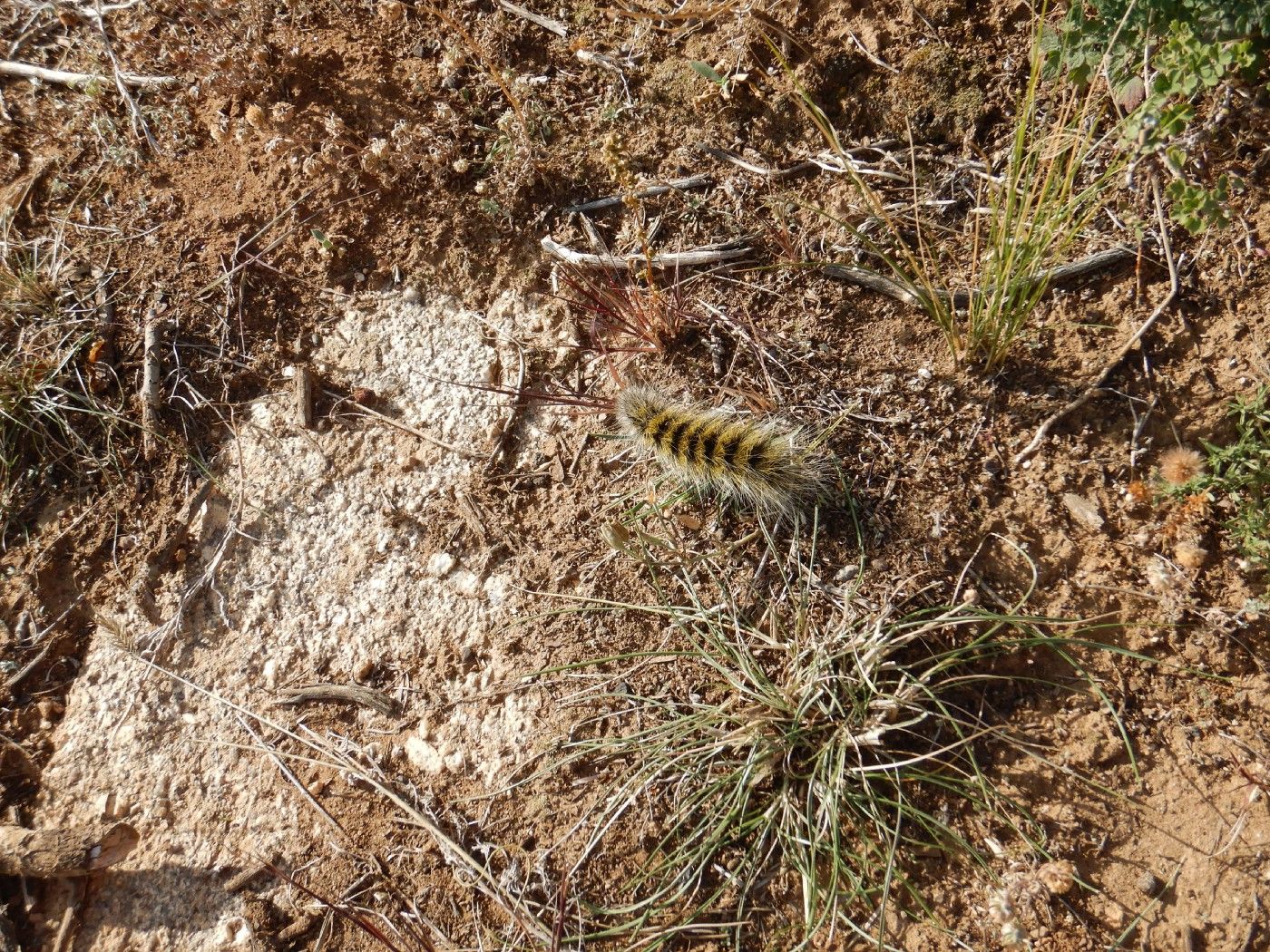
Insects revealed themselves through furtive movement, frozen instantly by my shadow.
I found plenty of mouse warrens, which were effectively small Hobbit hamlets between which there was clearly some serious Romeo and Juliet action going on between certain holes in the ground. Whether or not such action was officially warranted by the warrant officer in charge, who knew, but there sure was a lot of activity.
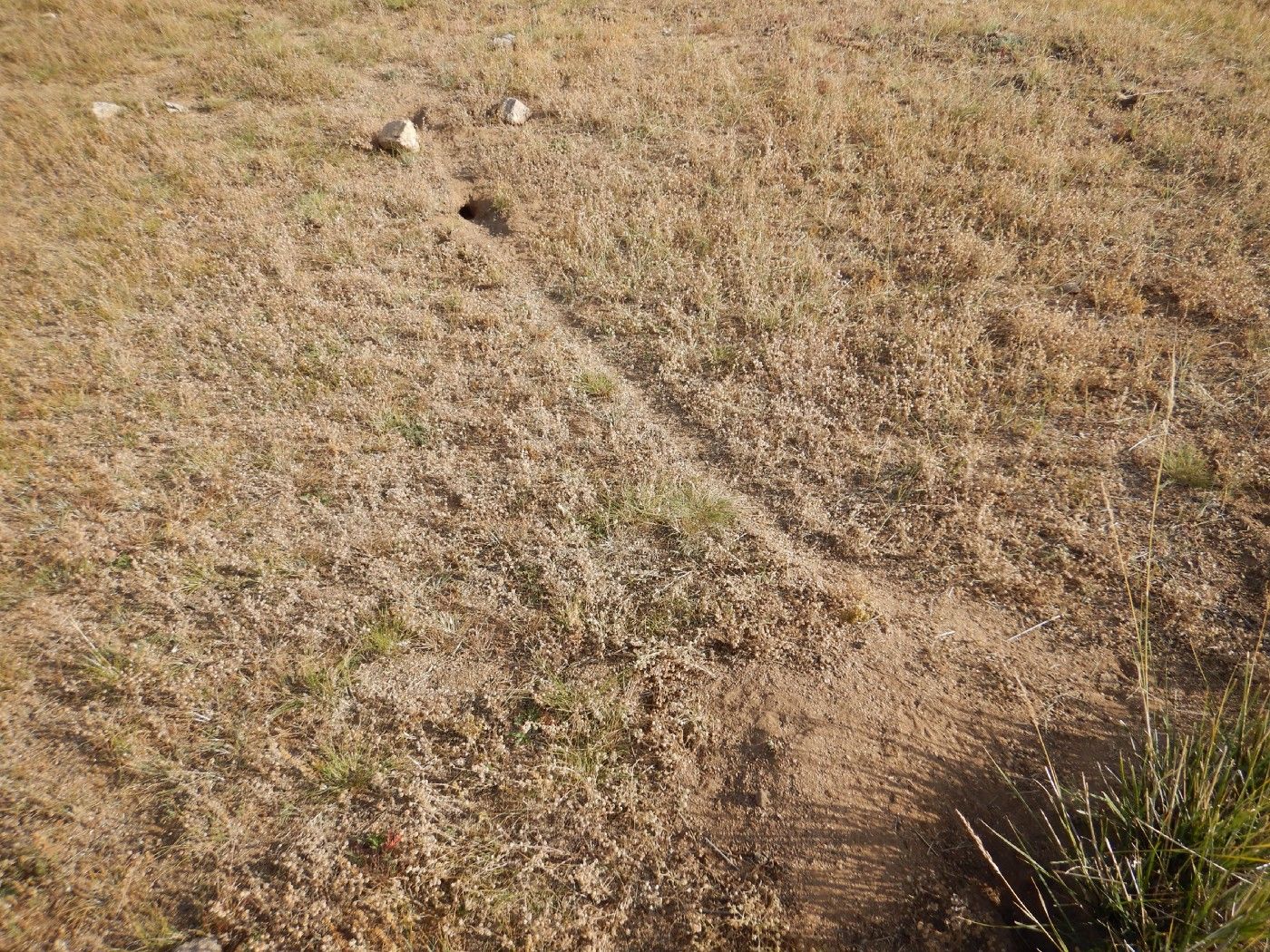
I meandered towards the horses. At first, they galloped towards me, ears forward in expectation. Food? A ride? Fun? Then they skidded to a halt as soon as it was clear that I wasn’t who they expected. Besides, I wasn’t holding a bridle, or a bag of food.
Phooey. They turned and meandered off in the opposite direction.
I was in a huge bowl, lined in all directions by Stone Giants. Off to my far right, a pair of falcons wheeled and sought, mostly likely, the mice that were burrowing in their small cities, utterly unconcerned with much more than ducking fast- moving shadows and sprinting swiftly enough to the neighbor’s Hobbit hole to live and love another day.
I walked slowly back. Scored an eagle’s feather, which I mistakenly left on the dashboard much later. Shit. Found umpteen skulls, cow and goat and sheep, their bodies licked clean by the endless sun and endless procession of insects and scavengers.
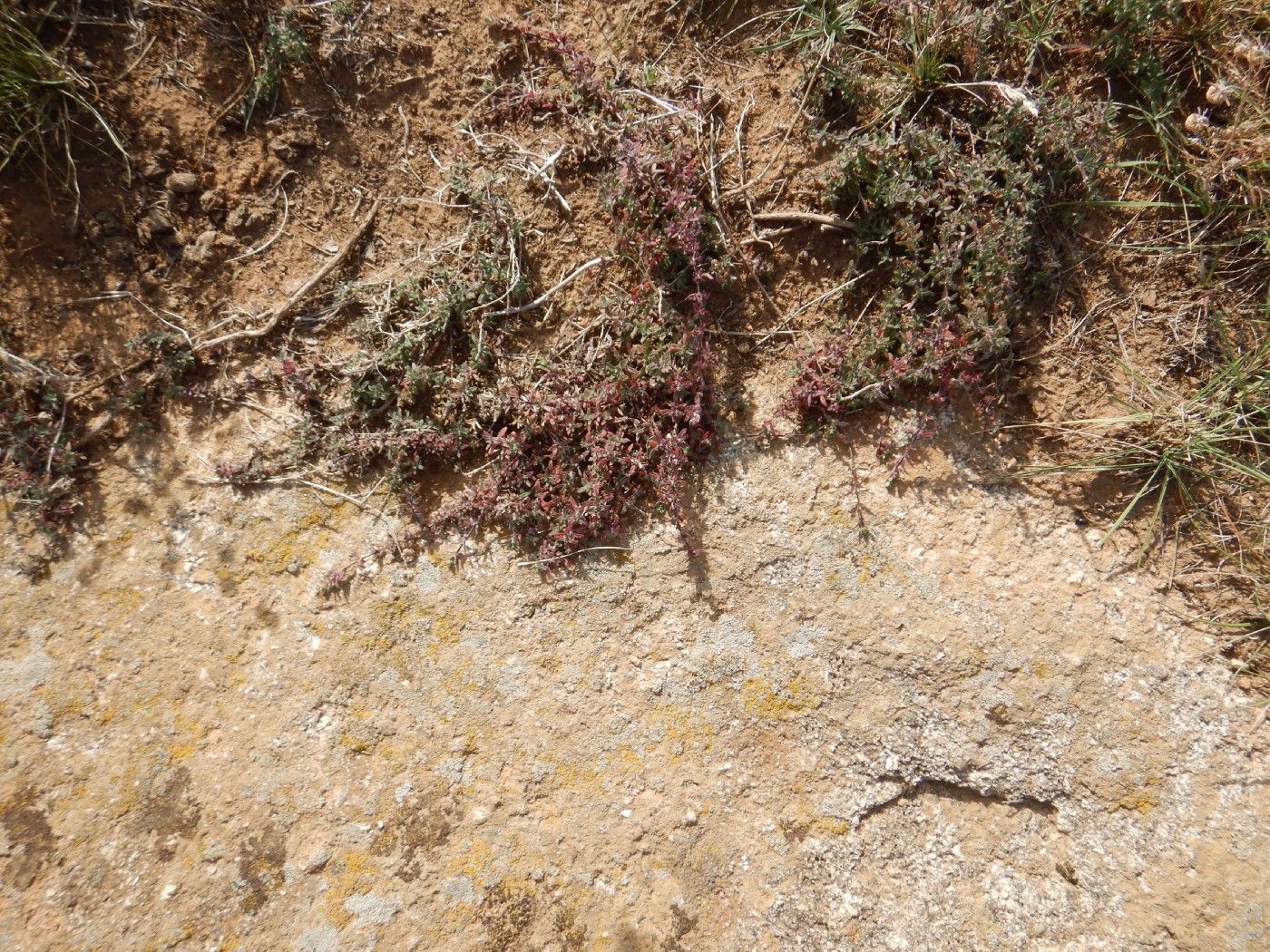
I took photos. Climbed. Stood out in the wide open spaces and felt the wind through my clothing. At one point I was aware of a distant roar, which felt and sounded like an oncoming wave. A very big wave. I looked in all directions for something mechanical but saw no corresponding puff of dust. A few nomads live here, and they use motorcycles for herding.
This wasn’t that. My glacier glasses, tinted so as to control the worst the sun had to offer, offered me a great view but whatever was roaring my way wasn’t part of it.
Seconds later I was right underneath it, a great rushing blast of sound so close I could nearly touch it. A huge flock of birds, whose name my biologist guide couldn’t translate to English, swooped, dipped, and reformed as a single body on its way to a far-off massif of their own. It was a singular experience.
I am no birder, but I know ecstasy when I feel it.
I think that’s when the Stone Giants took my phone. I was so stunned that I fumbled around in my Kuhl fleece kangaroo pocket, a front loader so deep you could drop your entire house into it. At that point, my moto took a meander.
I am convinced, drawn to better things, to lie and quietly die in the magnificent desert, time and battery spooling down like an old woman watching the herds pass by her ger.
I kept walking, ignorant that my technology had gone walkabout.
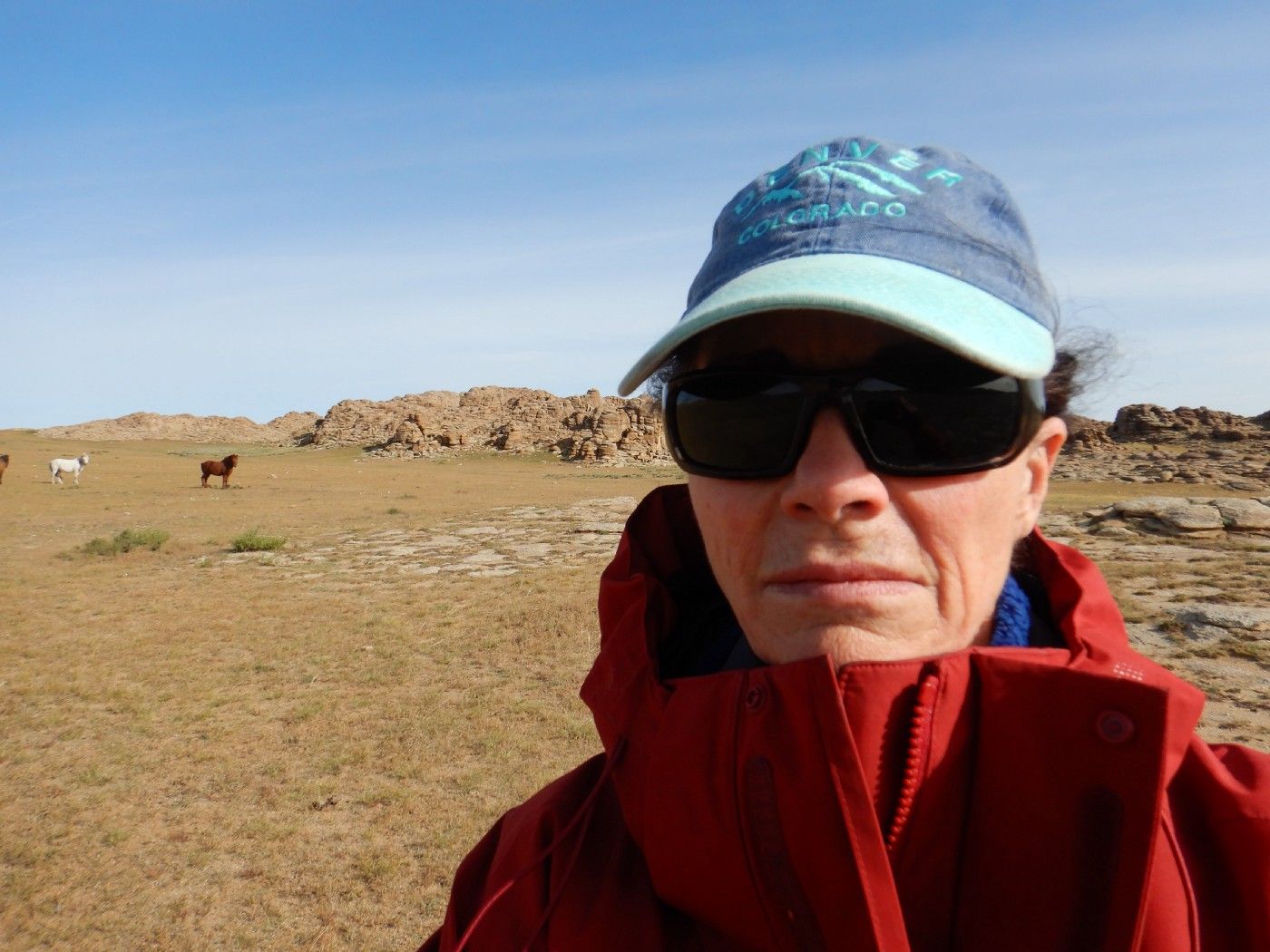
I zigzagged across the desert back towards the rock massifs. They threw gargoyle shadows in the early afternoon sun. Below them were small pockets of trees.
Found mating beetles and bright fuschia flowers good for the kidneys. Naka taught me that.
When I finally got back to the van, Naka and Nasa were waiting for me and eager to get going. It would be a very long drive back to UB, and the three of us would be mourning the vast expanses of desert, the openness and emptiness as we slowly submerged ourselves in the miasma that is modern-day Ulaan Bataar.
As I unpacked my kangaroo pocket, I realized my phone was gone.
Well shit.
There followed the classic patting of the same damned pockets four times over as if somehow magically, a $500 piece of technology will transport itself where it wasn’t seconds before. Horses do the same thing, turning away for a second and nosing your empty hand for the treat that it just ate, but surely another one is here? What about that pocket? What about your butt pocket?
Nope.
After we tore the van apart, to no result, we fanned out. I had covered a considerable amount of territory, weaving and wobbling as my instinct and balance directed me. I had no clue where to look. Each rock canyon, with the except of the unique formations, was just like the next. None revealed my passing any more than the millions of goats. At least goats left goat shit. I had left nothing.
I retraced my steps. Sort of. The incessant winds had already erased all trace of my presence on this dusty bowl, on these rocks. What little tread my Lowas may have made were already strewn miles in all directions, as inaccessible as the roar of birds over my head.
We tracked patiently in all directions. Looped around. It got hotter. My layers made me sweat. Surely a man-made piece of technology, burnished to a shine, would reflect this burning sun? Surely, if a camera lens could flash at us from miles away across a canyon, my mobile phone could send out an SOS?
Nothing.
At the end of more than 90 minutes, the three of us had trudged back to the van empty-handed.
“Just call yourself on someone else’s phone,” you say.
Uh-huh.
In this I might point out that you might not truly understand Mongolia. There really is no signal out here. Besides, even if we could call it, my Monday Night Football ringtone would be lost in the roar of the wind. Like the cries of every dying thing out here.
I resigned myself. Honestly, who the hell cares? It was an extra. Sure there were photos. Yes, my emails are being moved to another server, my system is down, and texting is all I have left. Sure, I need to contact my guides and operators for various things. And so? I can’t find other ways to do that just as I always had long before I finally gave up and brought the damned thing along?

It was a pain. I was already thinking about what next, when my two guides demanded that they fan out once again. Modernized Mongolians have just as intense a connection to their technology as we do, but perhaps it’s for different reasons. They are a people still deeply entrenched in pre-Revolution Russian control, barely 27 years past their freedom. Phones are a lifeline to a new life, and they promise (if not deliver) a kind of wild freedom that wasn’t available under the yoke of Mother Russia.
In many ways I suspect that the Mongolian people feel much like the magnificent golden eagles of their Kazakh neighbors to the West, who are in Mongolia, but through and through Kazakh. They are beginning to fly free. So Naka and Nasa were not willing to let me lose one of the great symbols of their emancipation. But that’s just my impression.
I understand but was tired. No, I said. Let it go. We climbed in the van, all of us quiet. I was thinking about how to file an insurance claim while both of them were plotting another reconnaissance. Since my Mongolian is all of one word for thank you, I had no idea.
Nasa curved back around to the big bowl where I had approached the three horses and parked. By this time the sun was tracking past noon, and we were going to land in UB at the worst possible time (there is no good time, unless you drive at about 2 am). He asked a local herder, a boy of about twelve with the deeply sunburned face, slanted eyes and smooth skin of young Mongols to keep a watch. How that young man would be able to get a phone back to us was beyond my ken, but stranger things have happened.
Nasa headed East. I headed back towards where I’d found the mouse cities. Naka asked me where I’d peed. Back in the rocks, I said.
Silence. Wind. Falcons wheeling overhead. I wanted to stay right where I was. Forever, maybe. Like my phone, slowly unspooling the time of my life as the horses and goats grazed and the great birds hunted mice, throwing shadows on my sunbaked face. Like my mobile phone.
THERE IT IS!!!!
Naka let out a banshee holler. I’d never seen her that gleeful, even though as a trained biologist we had seen more wildlife on our trip than any other. The damned phone was more of a prize to her than a Saiga antelope, which is almost extinct.
The glint of the sun off the brooding face of my phone caught my eye.
At some level I wasn’t happy to see it.
For me, it’s a tether to a way of being that in a lot of ways I’d love to leave behind.
As the Mongols are rushing headlong into a very murky future, with their phones and mad affection for consumerism (don’t believe me? You should see the shopping centers and car dealerships here), I am moving in the other direction. I could easily let my technology, or much of it, just….go.
I may not die with my face towards the sun in some Stone Giant’s playground, but I most assuredly hope to let my own life unspool in a place where monks would be happy to meditate.

Comments powered by Talkyard.